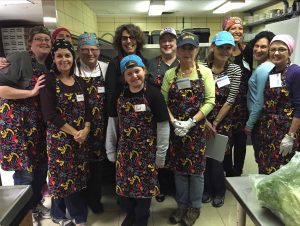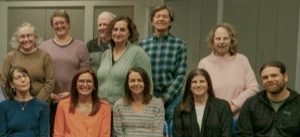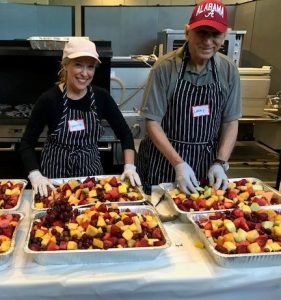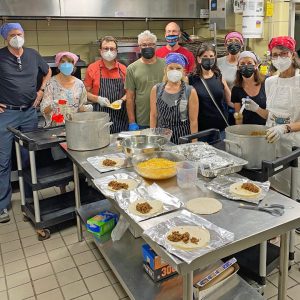Podcast: Play in new window | Download
Shari talks with the Soup Kitchen founders Nancy Bashook, Jeff Forgash, and Jessie Macdonald and co-chairs Tracey Denlow, Leslie Shulruff, and Beth Tucker. The Soup Kitchen recently celebrated its 20th anniversary and was renamed in honor of Rabbi Peter and Elaine Knobel. Shari and her guests discuss its origins and impact, how meals are prepared, volunteer responsibilities, and operating during the pandemic. They also discuss how you can help!!





The Rabbi Peter and Elaine Knobel Soup Kitchen at Beth Emet History:
Every Wednesday evening since 2002, Beth Emet has opened its doors to members of the community in need of a nutritious dinner. Guests sit at linen-covered tables with fresh flowers and listen to live music while enjoying their meal, and they leave with a sack lunch to enjoy on the following day. The Soup Kitchen serves 70 to 90 guests weekly.
The Soup Kitchen has continued providing weekly meals throughout the pandemic. However, we have made important operational changes in order to safeguard the health of our guests, volunteers, and staff.
Happy 20th Birthday Beth Emet Soup Kitchen!!
Twenty years ago, on the first Wednesday of November 2002, the Beth Emet Soup Kitchen opened its doors to provide dinners for people in need. The process, from its initial conception to the opening, was a year in the making. The Soup Kitchen was the brainchild of a small group of Social Action Committee members with the enthusiastic support of Rabbi Peter S. Knobel (of blessed memory) and then- board president Bob Render. The Beth Emet Board was interested but cautious, concerned as boards should be about issues of liability and security. Finally, Bob Render’s son Nathan said to him, “Stop worrying, the Soup Kitchen shows what our Jewish values are — this is what we should be doing!” With the Rabbi’s and Bob’s encouragement, the board decided in favor of serving the community.
The original 3 founders were Jessie Macdonald, Nancy Bashook and Jeff Forgash, but they were soon joined by Tina Herpe, Liz Coustan, Susan Fisher, Patti Gerbie, Rich Libles, Art Sontag, Mayta Spitz, Kathy Kaberon and Nathan Render. These twelve people made up the Soup Kitchen’s first Steering Committee that developed the organizational protocol that is still followed today: financial record keeping, volunteer coordinating, security, and administrative/site supervisor staffing.
Over the next 20 years, many other Beth Emet members joined the Soup Kitchen Committee and many, many more volunteered their time on Wednesday evenings to cook, serve dinner, play music, bake desserts and bread, clean up and generally offer gracious hospitality to the growing numbers of people who came to dine. Community support was broad, with businesses donating desserts, bread, fruit, and other items. Volunteer groups came together from Beth Emet committees and from the congregation in general, as well as from various civic organizations and other synagogues on the north shore.
The Soup Kitchen’s leadership has changed very little since 2002:
- Chair: Jessie Macdonald 2002 – 2015; Leslie Shulruff 2015 – present
- Vice chair: Nancy Bashook 2002-2015; Lizzie Graham & Donna Wolf 2015 – Jan. 2022; Beth Tucker & Tracey Denlow Jan. 2022-present
- Security Host: Jeff Forgash 2002-present
- Financial: Tina Herpe, Bonnie Goodman, Lizzie Graham, Elizabeth Lerner, Becca Nolan (current)
- Volunteer Coordinator: Liz Coustan, Julie Forgash, Mayta Sptiz, Paul Isaacson, Jessie Macdonald, Kelly Austin, Susan Melczer (current)
The Soup Kitchen has become an integral part of Beth Emet’s commitment to social justice. Although the years of the pandemic have been challenging, they’ve also been skillfully navigated by Leslie, Jeff, and their team of leaders. We at Beth Emet and in the interfaith community continue to advocate and work for the changes in policies that contribute to homelessness, poverty, and social isolation. In the meantime, the Soup Kitchen will continue to fulfill its original mission — to provide a nourishing homecooked meal in an atmosphere of dignity and graciousness.
How to Start a Soup Kitchen
(Article appeared in Beth Emet bulletin October 2002)
What a title! Maybe we should wait three months, when we have a list that reads “What not to do when starting a soup kitchen” … And yet, after almost a year of dreaming and planning, we’re ready, putting the last pieces into place, prepared to evolve and take things as they come. Starting in November, Wednesday evenings will be Soup Kitchen night at Beth Emet!
How did we get to this place?
The idea to start a soup kitchen at Beth Emet had been quietly percolating for a couple of years. But it was Capital Campaign time, not a time to embark on such a venture. Then during August of 2001, the Executive Committee of the Beth Emet Board asked the Social Action Committee to develop an organic plan that would engage the participation of the entire congregation in social justice and activism. Some veteran soup kitchen volunteers posed the question, “Why couldn’t we do this here, right here in our own building?” Many meetings later Project Hamotzi and the Beth Emet Soup Kitchen were born.
What’s happened along the way?
How did we get from posing the first challenge to “4 weeks to Opening?” It’s been an incredible journey of collaboration and partnership between so many synagogue and non-synagogue members.
First a small group, the “Soup Kitchen Feasibility Committee,” began visiting the other soup kitchens in Evanston. Countless phone calls were made, and emails sent to groups here and across the country. “Who runs other soup kitchens? How do they operate? What are the issues? Do Jewish groups have issues that non-Jewish groups don’t face?” We gathered as much information from other people as we could. We spoke to our own leaders: our rabbis, the cantor, our executive director, members of the board of trustees. We wanted to gauge their interest, hear their concerns. The excitement was palpable; the questions were numerous.
We quickly realized that our explorations fell into five general categories: operational, financial, administrative, staffing and marketing. We met with representatives of the Evanston Health Department, the Evanston Police Department, our alderman, leaders of soup kitchens at Evanston churches. We called MAZON: A Jewish Response to Hunger, and synagogues here and in other states for advice and support.
We found that there are several synagogues nationally that participate in coalitions that shelter homeless people during the winter months. We also found any number of synagogues that regularly cook meals and deliver them to other facilities for distribution. Although there may be some, we didn’t find other synagogues doing just what we envisioned. Our excitement was growing at perhaps being “pioneers” in the Jewish community.
The questions we needed to answer grew more specific. “What door will people enter? What restrooms will they use? How many people can work in the kitchen at one time? What exactly do we mean by “meal sponsorship”? (Oh, the emails back and forth were plentiful on that question!) How do we set up an equitable system of food purchasing and volunteering?”
In our explorations, we discovered two general models for running a soup kitchen. Some kitchens, such as the one at Hemenway United Methodist Church, have a regular purchasing and cooking committee. Food is paid for from financial donations and volunteers from the community come in only to serve dinner. On the other hand, the soup kitchens run by EEAC (Evanston Ecumenical Action Council*) schedule different sponsoring groups (Beth Emet among them) to provide the food, cook and serve it.
We decided early on to use the latter model since it was less dependent on fund raising to start things off. And we also decided it was best to be independent of groups like EEAC, FACE (Food Assistance Center of Evanston) and the Greater Chicago Food Depository. We wanted the maximum flexibility to modify our plans without outside constraints.
When we finally went to the Beth Emet Board last June to ask for a vote, we felt ready to answer any questions posed to us. The Board’s response was fantastic! One former Board President even came to the meeting so she could weigh in with her approval. Now that was a sweet moment!
The feasibility group evolved into the Soup Kitchen Steering Committee. More people came on board. The congregation’s desire to embrace this transformative opportunity for tikkun olam has been enormous and inspiring. More than once we heard, “This is just what I’ve been waiting for. I want to help.”
And “help” is being offered in many ways. The Wednesday evening schedules are filling up with volunteers. One member, who is a trained pastry chef, has offered to bake bread or make desserts at home every other week. A Beth Emet member who is a chef and cooking instructor has put together different menus for us. Another member, “raised in restaurants” as she put it, has opted to help plan a festive December 25 meal. (Christmas dinner at Beth Emet!!) Another congregant wants to play the piano twice a month during dinner. Yet another member has very generously donated paper goods. The financial contributions are starting to come in too; many of them in memory or honoring loved ones. We are thrilled with the response so far!
So, who will be coming to these dinners?
Soup kitchen guests (we estimate 70 to 90 people) will all be hungry and in need of food, but they are different from one another in the circumstances of their lives. We know that Carl will be there. Carl, the gentle, child-like man who lives alone in his boyhood home, in a neighborhood not far from Beth Emet. He is lonely and comes to the soup kitchens, so he doesn’t have to eat alone every night. And certainly “Sarge” will come. Calm, dignified Sarge is usually reading a book as he sells “Streetwise” outside a downtown grocery store. He’s been an enthusiastic supporter all along and the source of some good advice. (“Don’t use real knives and forks—people will take them. Use plastic.”) Then there are the numerous men and women who don’t look very different from the rest of us, but who have fallen on hard times and struggle to make ends meet. And there will be some people who do look different, but we’ll come to know and understand them and challenge a society that allows poverty, homelessness, and injustice.
The Soup Kitchen’s opening in November is moving closer. Are we excited? Yes. Are we nervous? Yes! And we know we’re going to learn at least a few more lessons in “How to start a soup kitchen”.
And yet, mostly we are grateful to be part of Beth Emet, a synagogue full of people who embrace that sense of justice given to us by our Creator. A congregation that strives to see how we are all connected to our brothers and sisters who live in poverty or need. A congregation that refuses to turn away from those in need. “Let justice roll down like waters, and righteousness like a mighty stream.” It’s time to cook!
Jessie Macdonald, Beth Emet Soup Kitchen Chair
Nancy Bashook, Social Action Committee Chair
*Now called Interfaith Action of Evanston
Beth Emet – The Free Synagogue: https://bethemet.org/
The Rabbi Peter and Elaine Knobel Soup Kitchen at Beth Emet : https://bethemet.org/act/soup-kitchen/
Get your copy of Maximize Your Return on Life here.
To learn more about Shari Greco Reiches, visit https://
To learn more about Rappaport Reiches Capital Management, visit https://rrcapital.com/
